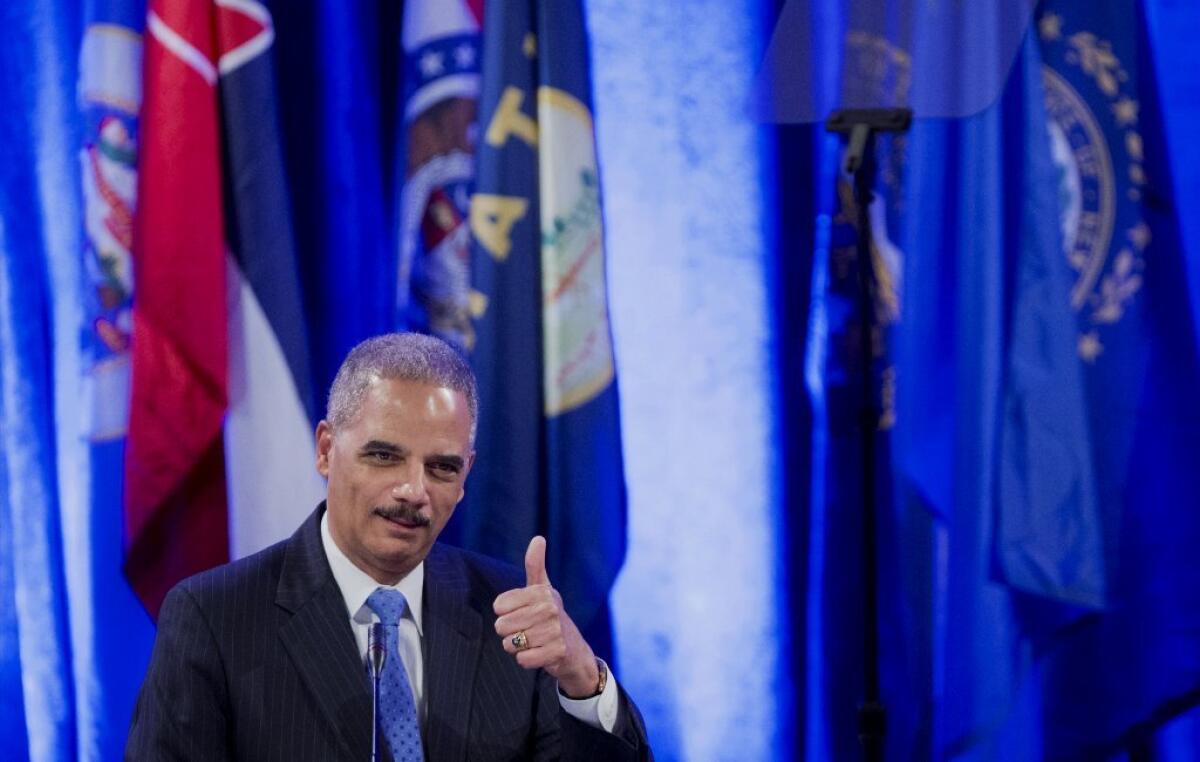On gay marriage bans, Holder’s view may be too liberal

U.S. Atty. Gen. Eric H. Holder Jr. seems to see himself as a minister of justice with responsibilities that transcend the actual duties of his job. In his latest pronouncement, Holder told the New York Times that state attorneys general should feel free to refuse to defend the constitutionality of their states’ bans on same-sex marriage. Several state AGs — all Democrats — have done just that.
Holder compared defending a ban on same-sex marriage to defending the system of segregated public schools in Kansas that was declared unconstitutional by the Supreme Court in 1954. “If I were attorney general in Kansas in 1953, I would not have defended a Kansas statute that put in place separate-but-equal facilities,” he said.
Unaddressed in the interview (or in a follow-up speech Holder delivered Tuesday to the National Assn. of Attorneys General) was whether Holder believes that, if a state attorney general chooses not to defend a state law or constitutional provision, someone else should be allowed to.
That is an issue the Los Angeles Times editorial board has wrestled with. We opposed Proposition 8 and were pleased when a federal district judge declared it unconstitutional. But we also wrote this in 2011:
“No matter what the California Supreme Court eventually decides about Proposition 8, both its liberal and conservative justices voiced one important take-home lesson with great clarity and conviction: Democracy is thwarted when no one defends the will of the people.
“At issue in last week’s oral arguments was whether the proponents of Proposition 8 have the legal standing to defend the measure at the appellate level in federal court. The governor and attorney general have refused to do so.
“Make no mistake, Proposition 8 should die in the courts. But it should fail on its merits — its discriminatory withholding of the right to marry — rather than because the officials who could have defended it wouldn’t and no one else was allowed to step in....
“If state officials are unwilling to stand up for Proposition 8 — or believe their ability to do so is compromised because they opposed the initiative, as Jerry Brown has as governor and previously as state attorney general — the state should be required to hire an attorney to provide the best possible defense. The constitutionality of Proposition 8 is for the courts to decide, not state officials.”
Of course, Proposition 8 is a dead letter — and same-sex marriage is alive and well in California — because the U.S. Supreme Court ruled last year that Proposition 8’s supporters lacked legal standing to appeal a decision striking it down.
All’s well that ends well? In one sense, yes — but how much more satisfying the victory would have been if Proposition 8 had had its day in court.
ALSO:
Can car-happy L.A. learn to share the road?
Is Benedict helping Francis ‘downsize’ the papacy?
Netflix’s deal with Comcast isn’t a sign of the apocalypse
Follow Michael McGough on Twitter @MichaelMcGough3
More to Read
A cure for the common opinion
Get thought-provoking perspectives with our weekly newsletter.
You may occasionally receive promotional content from the Los Angeles Times.







